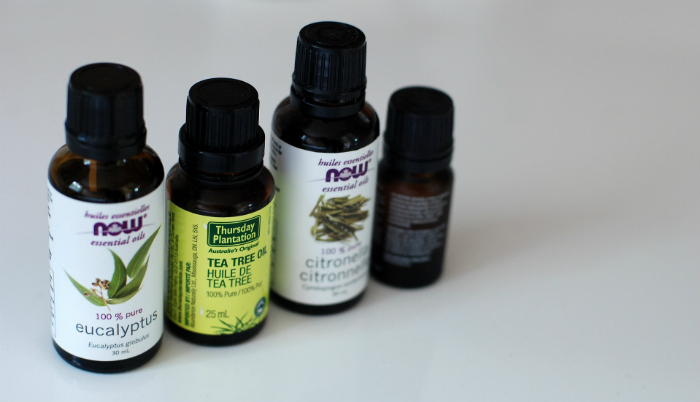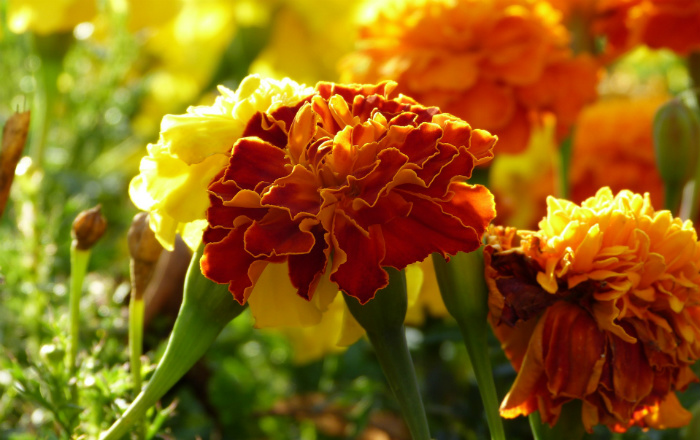Table of Contents
- 1 1. Citronella oil or spray
- 2 2. Mosquito coils or sticks
- 3 3. BTI mosquito dunks
- 4 4. Coffee grounds
- 5 5. Peppermint oil
- 6 6. Eucalyptus oil
- 7 7. Cinnamon oil
- 8 8. Garlic
- 9 9. Neem oil or crushed leaves
- 10 10. Apple cider vinegar
- 11 11. Mouthwash
- 12 12. Oscillating fan
- 13 13. Mosquito repellent plants
- 14 14. Geraniol
- 15 15. Outdoor mosquito zappers
- 16 Additional tips
- 17 Final words
The outdoors is the biggest breeding ground of mosquitoes. There’s stagnant water, untrimmed bushes, water fountains, and more where the insects can reproduce with ease. And when they need to feed, the mosquitoes will invade your home and suck your blood. With this, you shouldn’t just repel mosquitoes inside your home. You should also have some home remedies for mosquitoes outside.
The web is saturated with various mosquito repellents and other solutions that promise instant results. However, not all of them are golden. So to help you filter which one works, we’ve tried various home remedies for mosquitoes outside and we came up with these 15 solutions.
1. Citronella oil or spray
If there’s one natural solution to mosquitoes, it would be citronella. It’s the liquid gold of repelling and killing mosquitoes everywhere. Citronella is safe to use indoors and it’s also a perfect remedy for outdoor mosquito.
Citronella can come in either a spray or concentrated oil. Both are extracted from lemongrass.
However, you have to ensure that you got the right citronella formula. If blended right, this spray will be as effective as DEET and it will protect you from mosquitoes for hours.
If you don’t want to take chances on making your own citronella spray, we suggest that you purchase an oil product. We personally like the UpNature Citronella oil. It’s pure and safe to apply directly on the skin for utmost protection.
For outdoor use, you can spray citronella extracts on the areas where you would stay. Also, you can hunt for mosquito harborage and bombard it with this solution.
You can also use an oil diffuser on your patio to ward off the mosquitoes. Another creative option is to inject the citronella in a candlestick and light it up. Aside from the amazing smell, it will also send the insects away if you’re having al fresco dinner or just hanging out outdoors.

2. Mosquito coils or sticks
If you want an instant solution, mosquito coils or sticks are perfect or outdoor use. Just light up, place it in a holder, and enjoy the mosquito protection for up to 7 hours.
Take note that most mosquito coils are packed with pyrethrin. So when it burns, it produces smoke with an unpleasant smell. It’s not pungent, but it can be suffocating if you stand too close on the smoldering coil.
On the other hand, you can try mosquito sticks. Unlike coils, these are made of natural ingredients like citronella, eucalyptus, lemongrass, mint, and more. It produces a nice scent, plus you get to repel the mosquitoes away.
Take note, though, that mosquito sticks burn faster than coils. Also, sticks only repel the insect while coils can kill the mosquitoes. It’s just a matter of finding the right balance between the two.
For the best results, place a lit mosquito coil for every 10 feet. If you’re using sticks, put it at about 4 feet away from you.
NOTE: Mosquito coils and sticks are less effective in windy areas. If your place experiences strong winds, you’re better off trying other solutions here.
3. BTI mosquito dunks
You’ve probably seen those donut-shaped things floating on pools and fountains. These are called BTI mosquito dunks. BTI stands for bacillus thuringiensis israelensis, an organism that targets and kills mosquito larvae.
This product is typically used on stagnant water that can’t be drained. Once it gets soaked in water, the spores will be released to exterminate any mosquito population.
The good thing about BTI dunks is it’s totally safe. It won’t harm marine life and it will not irritate humans as well. It only targets mosquito larvae as well as gnats and fungi. Even the EPA has attested to the safety of BTI mosquito control products.
In fact, this product is so safe that it’s also used on lakes, rivers, streams, ponds, and other bodies of water. If you have a pool or water fountain at home, BTI dunks will be a big help to arrest the mosquito population.
For smaller spaces where water gets trapped, you can crush the dunks and sprinkle the bits. It’s effective in preventing mosquito breeding on your gutters and other open water sources.
4. Coffee grounds
For those who don’t have the budget to purchase expensive home remedies for mosquitoes outside, coffee grounds are your best bet. Instead of throwing the grounds after brewing, you can use it to exterminate the mosquito larvae and drive the insects away.
For stagnant water, you can sprinkle the used coffee grounds. This will deprive the larvae with oxygen which will lead to its death.
You can also place bowls of coffee grounds around to discourage the mosquitoes from staying. Aside from that, you can use the grounds as fertilizer after rinsing it well.
Take note that use of coffee grounds is a bit limited. Still, it’s a great way to limit the mosquitoes in your yard.
5. Peppermint oil
Mosquitoes find the minty scent of peppermint oil repulsive. This will keep them away from the treated area for hours. Also, peppermint oil is a natural solution which will not irritate the people around if applied properly.
For this, dilute a few tablespoons of pure peppermint oil in an equal amount of water. You can use this as an all-around insect spray to repel and kill mosquitoes.
If you sustained mosquito bites, you could also dab peppermint oil to the red spots using a cotton ball. This should ease the itching and help the bites heal fast.
Moreover, you can apply peppermint oil on your wrist, clothing hems, and sleeves to prevent the mosquitoes from biting.
If peppermint oil repels mosquitoes, would the plant work the same? Well, this is a common myth. But the truth is that the peppermint plant alone can’t repel mosquitoes as much as extracts do.
You have to activate the extracts by crushing leaves and squeezing the oil out. This substance is the one effective against mosquitoes. Nevertheless, if you’re planning to grow mosquito-repellent plants, you’re better off with marigold (see below).
6. Eucalyptus oil
Like peppermint, eucalyptus oil has a strong scent. You can use this as a standalone solution, or you can mix it with citronella to boost the mosquito-repelling effect.
The most effective variation is the lemon eucalyptus oil. This is extracted from the native Australian eucalyptus tree. It’s so effective in repelling mosquitoes which is why lemon eucalyptus oil is widely used as an ingredient to insect sprays and lotions.
The higher the concentration is, the more that the oil will be mosquito repellent. However, you should be careful in applying this oil, especially if you have a toddler or if someone in your house is pregnant. Also, never ingest eucalyptus oil. This can be deadly if consumed in large amounts.
Anyway, you can balance the risk and benefits of eucalyptus oil by mixing it with other essential oils. We personally like lavender since it adds a repellent effect while giving off a nice scent.
Anyway, if you’re using eucalyptus oil outdoors, there shouldn’t be any problem even if it’s a concentrated type. For easier application, you can dilute eucalyptus oil in water and transfer it to a spray bottle.

7. Cinnamon oil
Cinnamon isn’t just a delicious herb for your food. It’s also effective in driving the mosquitoes in your yard. Cinnamon, both the oil and the bark, is effective in driving the mosquitoes away. But if you want to kill the insects in your yard, cinnamon oil is your powerful weapon.
A Taiwanese study published in the American Chemical Society found out that some compounds in cinnamon can kill mosquito larvae.
Moreover, the study was conducted on the Asian tiger mosquito (Aedes aegypti). Such species is the notorious carrier of dengue fever, yellow fever, Zika virus, chikungunya, and other life-threatening diseases.
To make a cinnamon oil spray, you should dilute 24 drops to 4 ounces of water. Mix it well and transfer the solution to a spray bottle.
Such a mixture is safe to spray around, both indoors and outdoors. In fact, you can also apply it to your clothes before going out in your yard.
This is an environment-friendly solution that won’t harm your plants and the beneficial insects in your yard. You can even blend it with other essential oils to enhance the repellency and the scent.
8. Garlic
Before you gobble garlic cloves, hold up!
Garlic is an effective mosquito repellent if crushed and used as a spray. What works here is the smell of the garlic. It’s pungent and the mosquitoes can’t stand it around.
You can crush the cloves and mix it to create a spray. However, if you want to unleash the highest repelling power, you can boil the crushed cloves for a few minutes.
Let this mixture cool down overnight. The next day, transfer the solution to a spray bottle so you can apply it easily.
Moreover, you can spray this on your patio, shed, and other outdoor spots where the mosquitoes love to stay. It’s one of the most convenient home remedies for mosquitoes outside that you can try.
The only downside about this treatment is that the garlic smell can do too overwhelming.
Another common practice is eating garlic to repel mosquitoes. This is only effective to a mild extent. Also, you have to endure the bad breath just to keep the insects from biting you.
9. Neem oil or crushed leaves
Neem is a natural alternative to pesticides. It’s efficient in repelling mosquitoes, especially if you use the oil extract. A study in Ethiopia found that neem oil can give up to 70% mosquito protection for a maximum of three hours.
You can also dilute the oil in water to create a repellent spray. This solution can be applied around your yard without damaging your plants. However, you should avoid spraying this directly to the skin since neem oil isn’t rated for topical application.
Aside from the spray, you can also burn a few neem leaves to drive away the mosquitoes. This is a common practice in tropical countries where neem trees are abundant.
Another option that you can try is adding neem oil to your kerosene lamp. This will diffuse the repellent effect without the need to burn something in your yard.
Just remember that neem oil doesn’t smell like roses. The leaves and oil have a pungent whiff. Nevertheless, it’s a worthy repellent for outdoor use.
Anyway, you can mix neem oil with other essential oil to mask the unpleasant smell. We always prefer lavender since it smells good plus it has a mosquito-repellent effect as well.
10. Apple cider vinegar
ACV is like an ancient elixir that can be used for a variety of purposes. You can add it on your food, mix it with facial clay, or use it as a mosquito repellent. Aside from that, ACV is also great in clearing dandruff, body odor, and acne. What’s not to like?
Let’s just get something clear: drinking ACV doesn’t have any mosquito repellent effect. Nevertheless, it’s good for your health if consumed in controlled amounts.
To make an apple cider vinegar repellent, you only have to dilute one part of ACV to one part of water. Overall, this will be enough to repel the mosquitoes.
However, ACV isn’t the best-smelling substance. To mask the pungent smell, you should blend with any essential oil of your choice. It could be lavender, citronella, eucalyptus, cinnamon, and more.
This ACV mixture is very cheap and easy to do. It’s also a great alternative to pesticides and expensive mosquito repellents.
In addition, you can apply the ACV solution topically if you want added protection while staying outdoors. However, if you’re planning to spray it on your body, make sure that you use the right essential oil. Avoid strong ones like eucalyptus, peppermint, and neem.

11. Mouthwash
This may surprise you, but yes, your bottle of Listerine can drive the mosquitoes away on your yard. There’s no rocket science here, though. Mouthwash products have traces of eucalyptol, which can kill mosquitoes on contact.
Aside from that, mouthwash products have a nice smell. This way, you no longer have to purchase essential oils.
The thing about mouthwashes is that you have to spritz it directly on the mosquitoes. Also, you can apply this to larvae-infested stagnant water.
If you want to boost the mosquito-killing effect of the spray, you can add a pinch of cayenne pepper on it. However, avoid spraying cayenne-blended mouthwash on your skin and other surfaces where you have direct contact.
Anyway, the mouthwash solution is only effective for killing the mosquitoes upon contact. If you’re looking for a stronger repellent, we suggest that you explore other options we discussed here.
Nevertheless, you can mist the diluted Listerine on your skin. This will discourage the mosquitoes from biting you for a short period. Also, it will make your skin feel cool, but with a little stickiness.
12. Oscillating fan
If you don’t want to use any chemical or substances for the outdoor mosquitoes, you simply have to use an oscillating fan. The middle speed of the fan can disrupt the flight of the mosquitoes. Even better, the wind will sweep them away.
Mosquitoes are weak flyers. A wind speed of at least 0.9 mph is enough to mess with their wings. With this, an electric fan is a convenient solution.
Another benefit of using an oscillating fan is that the wind disperses your carbon dioxide emissions. As you know, CO2 is an attractant for mosquitoes. The oscillating fan will remove this away from your body.
Anyway, if you live in a windy place, you have the benefit of dodging mosquito bites. The only thing that you have to think about is the larvae that could be present around your yard.
It’s critical that you eliminate the larvae so no new mosquitoes will spring and invade your household.
The only downside with using an oscillating fan is that the effect is only present when it’s on. Also, you have to use a long extension cord if no electrical outlet is available nearby.
13. Mosquito repellent plants
Like we mentioned earlier, some plants repel mosquitoes. One good example here is Marigold. Aside from the vibrant color, Marigold is also effective in repelling the mosquitoes. You can plant it in your yard, deck, or balcony. Also, the distinct smell of Marigold is repulsive to mosquitoes.
If you don’t like Marigolds, you can also try planting catnip. It will send the mosquitoes in close proximity. However, you have to be careful if you have a cat that roams outdoors. Aside from planting catnip, you can also crush some leaves and place it all over the yard to drive the mosquitoes away.
Aside from repelling mosquitoes, Marigold is also effective in keeping tomato-eating insects away.
Another great option here is basil. Aside from having an endless supply of basil leaves for your dishes, you’ll also have a plant that repels mosquitoes.
You can also plant citronella, lavender, and lemon balm. Although this doesn’t repel mosquitoes as a plant, you can pick some leaves to create a mosquito repellent spray.

14. Geraniol
Geraniol is a terpene alcohol substance usually used in perfumes and fragrances. Since it’s extracted from citronella, rose, or lemongrass, there’s no doubt that this substance has a repelling characteristic against mosquitoes.
This substance is also the main ingredient on many insect repellents and pesticides. If used as a repellent outdoors, this substance will give protection against the insects for up to four hours.
Geraniol has a pleasant smell, one thing that makes it a common ingredient for perfumes. However, you should avoid spraying this near your eyes, nose, and mouth. Geraniol is a potent substance that may lead to irritations.
Moreover, Geraniol also possesses antimicrobial and anti-inflammatory benefits. Still, you shouldn’t consume this substance.
Take note that Geraniol is colorless, so it’s best to store it in the original container. Also, if you have sensitive skin or a bad case of allergies, Geraniol may trigger attacks.
Nevertheless, if used safe, this should be harmless for humans, domesticated animals, and plants.
15. Outdoor mosquito zappers
If you want a mosquito killer that will work all day long, you should invest in mosquito zappers. These look like porch lights, but it will zap the insects that will come in contact with the charged surface.
The heat from the lights will attract the mosquitoes and buzz them to death. You can place multiple units outdoors to kill as many mosquitoes as possible.
Aside from killing the insects, it will also double as decorative light. Just keep this on overnight and during the day to exterminate more insect pests.
If you’re looking for the best outdoor zapper, we recommend the Flowtron Electronic Insect Killer. It looks like a typical outdoor lamp so that it won’t disrupt the aesthetic of your property.
Aside from this type of zappers, you can also use mosquito electric rackets. Simply swing it around until you hear a sizzling sound, a sign that you’ve caught mosquitoes. This is a cost-efficient and fun way to address the mosquito population outdoors. You can also use these electric racket zappers indoors.
Additional tips
*Target the harborage of the mosquitoes
Aside from killing the adult flyers, you should also focus on eradicating the larvae and eggs of the mosquitoes. This way, you can eliminate the whole population fast.
*Be careful with potent substances
If you’re using concentrated oils and other substances, avoid spraying it directly on plants. Even if these substances are natural, it may still damage the vegetation.
*Don’t use outdoor solutions indoors
Most natural sprays are safe to use indoors and outdoors. However, in the case of zappers, you should keep it outside only. This will prevent accidental burning.
*The efficacy of treatment will vary outdoors
Due to rain, sunlight, and wind, some repellents may last shorter than when it’s used indoors. The key here is consistent re-application and killing the mosquitoes down to its eggs.
Final words
These home remedies for mosquitoes outside are helpful. Most are affordable and can be made using household items. Do you have more suggestions? Let us know below!

